Stanley E. Porter Language and Interpretation Collection (22 vols.)
Digital Logos Edition
Overview
Draw from a deep well of scholarly wisdom and linguistic expertise with the Stanley E. Porter Language and Interpretation Collection (24 vols.). As one of the world’s foremost experts in New Testament language and literature, Porter has been influencing NT studies as an author and editor for decades. This sizeable collection includes original works by Porter, six volumes from the well-respected Sheffield Reader Collection, as well as contributions from D.A. Carson, E.A. Nida, Craig A. Evans, and more. Students and scholars will appreciate volumes on discourse analysis, Greek idioms and rhetoric, the historical Jesus, translation and interpretation, the Synoptic Gospels, and resurrection studies.

- Includes helpful volumes in the fields of language and Interpretation
- Offers volumes on multiple areas of study creating a well-rounded and valuable collection
- Incorporates the wisdom and insight of many well respected language scholars
- Provides the perfect platform for anyone looking to further their language and interpretation knowledge in a myriad of subjects
- Title: Stanley E. Porter Language and Interpretation Collection
- Author: Stanley E. Porter
- Volumes: 22
- Format: Digital > Logos Research Edition
- Resource ID: {37C1605E-C188-429C-919F-8846A558C01A}
This title is included in the following collections
You can save when you purchase this product as part of a collection.
Logos 8 Ultimate Legacy Librar...
$21,749.99$21,749.99Logos 9 Ultimate Legacy Librar...
$24,999.99$24,999.99
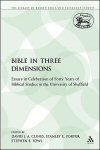
The Bible in Three Dimensions celebrates the contribution to the field of biblical studies from the University of Sheffield—initially under the leadership of F.F. Bruce and then John Rogerson. This volume is divided into three sections: literary readings of the Bible, studies in the social world of Israel and early Christianity, and questions of method.
Forty years of biblical studies at Sheffield provide cause for celebration and this book is an excellent expression of it. . . . There is a good balance between Old Testament and New Testament . . . [and] 18 essays in the book altogether . . . all highly readable and informative. Sheffield is to be congratulated on its 40 years, on this self-provided Festschrift, and more generally, on its phenomenal contribution to publishing in the biblical field.
—W.D. Stacey, Journal of Theological Studies
David J.A. Clines is professor of biblical studies and head of department in the University of Sheffield.
Stephen E. Fowl is professor of theology at Loyola College in Maryland. His previous books include The Story of Christ in the Ethics of Paul, Reading in Communion (with L. Gregory Jones), and Engaging Scripture.
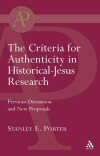
Historical-Jesus research continues to captivate the interests of scholars, and recently, there has been renewed discussion of the criteria for authenticity. The first half of this volume reviews the state of play in historical-Jesus research and examines the criteria in particular. One chapter is devoted to the so-called ‘Quests’, and a second critically charts the development of the criteria in the light of form criticism. One of the conclusions of this part of the volume is that several criteria, especially those based on linguistics, need reevaluation. The second half of the volume proposes three new criteria, based upon use of the Greek language. These criteria are: Greek language and its context; textual variance; and discourse features. The criteria are proposed as a way forward in historical-Jesus research.
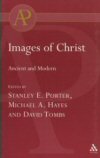
Images of Christ is a collection of essays that explores depictions of Christ in four media: the Bible, theology, literature and the arts. The biblical view of Christ is explored through a range of images from the messiah in the Old Testament to biblical metaphors used by the Church Fathers. The theologically oriented chapters are concerned with Christology in both Christian and non-Christian contexts, especially where the Christ image confronts traditional theological conceptions.
The treatment of the Christ image and the views of authors ranging from the medieval mystery plays to contemporary fiction are covered in the literature section. The volume concludes with chapters on how Christ has figured in the arts, from Rembrandt and other painters to film and the Christian Mass. The result is a collection of papers that embodies tremendous diversity in its exploration of a single figure.
Michael A. Hayes is head of the department of theology and religious studies at St Mary’s College, Strawberry Hill, Twickenham in the University of Surrey.
David Tombs is senior lecturer in theology at the University of Surrey Roehampton in London.
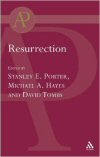
Resurrection
- Editors: Stanley E. Porter, Michael A. Hayes, and David Tombs
- Publisher: T&T Clark
- Publication Date: 2004
- Pages: 376
The theme of Resurrection has continued to prove fascinating for a variety of writers and thinkers, finding expression not only in sacred texts but in other works of literature and the arts. This volume contains the papers from one of the Roehampton Institute London Conferences. In this volume, scholars from a variety of places and varying academic disciplines have addressed the concept of resurrection from a number of critical perspectives. As one might expect, these include analyses of how the resurrection is understood in the biblical and other religious traditions. Also included in this volume are sustained treatments of the concept of resurrection as it appears in various literary texts and other artistic forms of expression.
Michael A. Hayes is head of the department of theology and religious studies at St Mary’s College, Strawberry Hill, Twickenham in the University of Surrey.
David Tombs is senior lecturer in theology at the University of Surrey Roehampton in London.
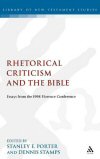
This volume explores the use of rhetoric in the study of biblical literature. The contributors are scholars from North America, Britain, Continental Europe and South Africa who focus on four major categories: the theory of rhetorical criticism, rhetorical criticism of the Old Testament, rhetorical criticism of the Gospels, and rhetorical criticism of the Pauline letters. The chapters here are the compilation of papers presented at the 1998 Florence Conference and reflect the myriad of ways the term rhetoric is used, understood and applied.
Dennis Stamps is ministerial development officer for St. Albans Diocese and Residentiary Canon of the Cathedral and Abbey Church of St. Alban. Recently he was appointed visiting fellow in New Testament and ancient rhetoric at the University of Chichester. He frequently lectures in New Testament studies and in many other areas of theology and ministry. He has edited several books and written numerous articles on rhetorical criticism of the New Testament. Previously he taught at the Queen’s Foundation, Birmingham and worked in parish ministry.
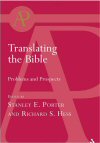
The topics covered in this volume, embracing both Old and New Testaments, range from detailed studies, such as how a particular biblical verse might be rendered from Hebrew or Greek, to larger philosophical and hermeneutical issues—the importance of tradition; how translations come to be canonized; and how a modern translation can and should be evaluated. The value of this topical and highly informative volume lies not only in its insights into particular translational cruxes but in the questions raised and answers suggested regarding translation theory and practice in a range of scriptural texts.
Richard Hess is professor of Old Testament at Denver Seminary in Colorado.
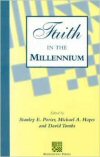
At the close of one millennium and the beginning of a new one, this conference volume reflects on the past and looks forward to a new era in terms of the development of faith. Although most of the papers in the volume address issues concerning Christian faith, the volume is not confined to such a perspective, since the concept of faith is treated here in an encompassing and broad manner. The historical perspective reaches back several millennia, addresses contemporary issues of economics and justice as they have a bearing on faith, and looks to the future as a new millennium presents its own problems and potential opportunities.
Michael A. Hayes is head of the department of theology and religious studies at St Mary’s College, Strawberry Hill, Twickenham in the University of Surrey.
David Tombs is senior lecturer in theology at the University of Surrey Roehampton in London.
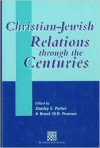
Christian-Jewish Relations through the Centuries
- Editors: Stanley E. Porter and Brook W.R. Pearson
- Publisher: T and T Clark
- Publication Date: 2000
- Pages: 503
Christian-Jewish relations have varied throughout the centuries; at times they have been peaceful with a semblance of mutual understanding, but occasionally these relations have been ones of tension, often involving recrimination and even violence. In Christian-Jewish Relations through the Centuries, the contributors address a number of major questions which have been at the heart and the periphery of these tenuous relations through the years. This important discussion begins with the emerging first-century Church as it began to define itself in terms of Judaism, then traces this relationship through the intervening years, including modern issues regarding anti-Semitism and the Holocaust. In its own way, this book becomes a part of the ongoing dialogue, tackling sensitive yet vital topics from a variety of approaches and perspectives.
Brook W.R. Pearson was senior lecturer in theology in the department of theology and religious studies at the University of Surrey Roehampton, London. Pearson is the author of Corresponding Sense: Paul, Dialectic, and Gadamer.
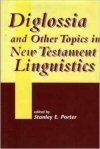
Diglossia is the existence within a society of sharply divergent formal and informal varieties of a language. Stanley E. Porter devotes the first part of this volume to the concept of diglossia, summarizing this important area of study in both the Septuagint and New Testament Greek. The second half of the book focuses on new aspects of research into the Greek of both Testaments, such as critical discourse analysis, and more traditional issues like the nature of the Septuagint translation.
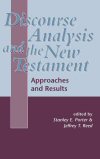
Some of today’s major discourse analysts of the New Testament have contributed to this resource, including E.A. Nida, W. Schenk, J.P. Louw and J. Callow. Their essays deal with the theory and method of discourse analysis and then demonstrate how to apply that methodology to studying the Gospels and Acts, the Pauline corpus, and the general epistles. Porter and Reed offer a helpful text readily accessible for all scholars interested in this increasingly important area of New Testament research.
Jeffrey T. Reed holds a bachelor’s degree in intercultural studies, a master’s degree in Greek, and a PhD in ancient history and religion with specialization in systemic functional linguistics from Sheffield University in England. He has published three books and over 20 articles about ancient history, first century religion and linguistics.
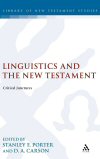
Linguistics and the New Testament: Critical Junctures
- Editors: Stanley E. Porter and D.A. Carson
- Publisher: Sheffield Academic Press
- Publication Date: 1999
- Pages: 297
Linguistics and the New Testament explores what the editors believe are crucial phases in the application of linguistics to New Testament Greek. The first half of the volume includes essays on such topics as linguistics and literary criticism, linguistics and historical criticism, and linguistics and rhetoric. The second half includes essays dealing with the relations and uses of individual words, but ranges from oral composition to the value of word frequency in determining authorship. Some of these essays review established models of research, while others propose new models and criteria of linguistic analysis.
Donald A. Carson is a research professor of New Testament at Trinity Evangelical Divinity School in Deerfield, Illinois. He has been at Trinity since 1978. Carson came to Trinity from the faculty of Northwest Baptist Theological Seminary in Vancouver, British Columbia, where he served for two years as academic dean. He also taught at Northwest Baptist Theological College, Richmond College, and Central Baptist Seminary in Toronto. He has served as assistant pastor and pastor and has done itinerant ministry in Canada and the United Kingdom. Carson’s areas of expertise include biblical theology, the historical Jesus, postmodernism, pluralism, Greek grammar, Johannine theology, Pauline theology, and questions of suffering and evil. He is a member of the Tyndale Fellowship for Biblical Research, the Society of Biblical Literature, the Evangelical Theological Society, the Canadian Society of Biblical Studies, and the Institute for Biblical Research.

This detailed reference work provides a comprehensive and wide-ranging introduction to classical rhetoric as it was practiced in the Hellenistic period (330 B.C.–A.D. 400).
This book is a thorough description and analysis of the standard categories of thought, terminology, and theoretical and historical developments of classical rhetoric, and includes useful bibliographies. The three sections of essays define the major categories of rhetoric, analyze rhetorical practice according to genre of writing, and treat individual writers in the rhetorical tradition 27 international scholars from a wide range of backgrounds have contributed to this high-quality resource, which provides a state-of-the-art overview of the current research and will form the basis of future explorations.
This massive collection of essays by various authorities will serve as a good basic introduction to the nature and history of classical rhetoric, even for those working outside the Hellenistic period . . . every rhetorician and every New Testament scholar should plan to read it . . .
—Terry L. Papillon, The American Journal of Philology
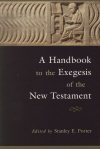
Handbook to Exegesis of the New Testament is a substantial theoretical and practical guide to the multifaceted discipline of New Testament exegesis. This volume covers current topics in New Testament exegesis in sufficient depth to provide a useful methodological basis. The introduction includes an analysis of the various definitions of exegesis, a term notoriously difficult to define, and a bibliographic essay covering the basic tools of exegesis. A section on method includes detailed discussions of the different models used in the major approaches to exegesis: textual criticism; linguistic analysis; genre criticism; source, form, and redaction criticism; discourse analysis; rhetorical and narratological criticism; literary criticism; and canonical criticism.
Also included are models based on analysis of the backgrounds of the New Testament in Hellenistic philosophy, ancient Judaism, the Roman Empire, and the works of second-century authors. In a section on application, exegetical methods are applied to the various literary units of the New Testament. This handbook serves well as both a textbook and a reference book for the major tools and topics in the area of New Testament exegesis.
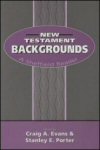
New Testament Backgrounds
- Authors: Stanley E. Porter and Craig A. Evans
- Publisher: Sheffield
- Publication Date: 1997
- Pages: 335
Presenting a thorough sampling of the myriad of scholarly thought on New Testament backgrounds, this volume collects essays from the renowned Journal for the Study of the New Testament. Contributors include T. Ewald Schmidt (“Hostility to Wealth in Philo of Alexandria”), Klyne R. Snodgrass (“Streams of Tradition Emerging from Isaiah 40: 1–5 and their Adaptation in the New Testament”), John G. Nordling (“Onesimus Fugitivus: A Defense of the Runaway Slave Hypothesis in Philemon”), and many others.
Craig A. Evans received his PhD from Claremont. He is Payzant Distinguished Professor of New Testament at Acadia Divinity College Wolfville in Nova Scotia, Canada.
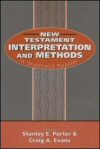
New Testament Interpretation and Methods
- Author: Stanley E. Porter and Craig A. Evans
- Publisher: Sheffield
- Publication Date: 1997
- Pages: 321
Collecting select articles from the Journal for the Study of the New Testament, this volume examines New Testament interpretation and methods from a variety of viewpoints. In two sections, “Principles” and “Practice”, distinguished scholars contribute essays on a number of important topics. Contributors include Christopher M. Tuckett (“The Griesbach Hypothesis in the Nineteenth Century”), F. Gerald Downing (“Redaction Criticism: Josephus’s Antiquities and the Synoptic Gospels”) Frances M. Young (“The Pastoral Epistles and the Ethics of Reading”), and many others.
Craig A. Evans received his PhD from Claremont. He is Payzant Distinguished Professor of New Testament at Acadia Divinity College Wolfville in Nova Scotia, Canada.
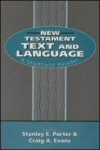
New Testament Text and Language
- Authors: Stanley E. Porter and Craig A. Evans
- Publisher: Sheffield
- Publication Date: 1997
- Pages: 311
This volume brings together an assortment of essays from the Journal for the Study of the New Testament. Illuminating the text and language of the New Testament are several top scholars in the field, including Carroll D. Osburn (“The Search for the Original Text of Acts—The International Project on the Text of Acts”), R. McL. Wilson (“Of Words and Meanings”), A.J.M. Wedderburn (“Some Observations on Paul’s Use of the Phrases ‘in Christ’ and ‘with Christ’”), and many others.
Craig A. Evans received his PhD from Claremont. He is Payzant Distinguished Professor of New Testament at Acadia Divinity College Wolfville in Nova Scotia, Canada.
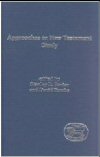
Approaches to New Testament Study
- Editors: Stanley E. Porter and David Tombs
- Publisher: Continuum International
- Publication Date: 1995
- Pages: 392
This collection of essays attempts to display, through theoretical discussion and practical application, a number of the most prominent approaches to New Testament study being practiced in the guild today. The contributors and their topics include: C. A. Evans on source, form and redaction criticism; T.R. Hatina on Jewish religious backgrounds; S.E. Porter on literary approaches; D.L. Stamps on rhetorical criticism; K.D. Clarke on canonical scientific criticism; D. Tombs on the hermeneutics of liberation; and B. Clack on feminist hermeneutics. The goal of the volume is to provide workable models for those interested in expanding or deepening their knowledge of the various approaches to New Testament study.
David Tombs is senior lecturer in theology at the University of Surrey Roehampton, London. He has contributed several books to the Studies in New Testament Greek and JSNTS Collection (16 Vols.) and the Library of NT Studies: JSNTS on Paul (17 Vols.).
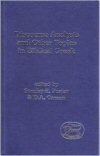
Discourse analysis is the study of the rules or patterns characterizing units of connected speech or writing. The essays here were first presented at the Society of Biblical Literature in the early 1990s. Stanley E. Porter contributes two chapters which survey discourse analysis—one dealing with New Testament studies and the other on how biblical discourse can be analyzed. Topical chapters include these subjects: identifying the theme in the New Testament; recognizing prominence in the text; interpreting the language of Paul; syntactical background studies; and diachronic analysis.
Donald A. Carson is a research professor of New Testament at Trinity Evangelical Divinity School in Deerfield, Illinois. He has been at Trinity since 1978. Carson came to Trinity from the faculty of Northwest Baptist Theological Seminary in Vancouver, British Columbia, where he served for two years as academic dean. He also taught at Northwest Baptist Theological College, Richmond College, and Central Baptist Seminary in Toronto. He has served as assistant pastor and pastor and has done itinerant ministry in Canada and the United Kingdom. Carson’s areas of expertise include biblical theology, the historical Jesus, postmodernism, pluralism, Greek grammar, Johannine theology, Pauline theology, and questions of suffering and evil. He is a member of the Tyndale Fellowship for Biblical Research, the Society of Biblical Literature, the Evangelical Theological Society, the Canadian Society of Biblical Studies, and the Institute for Biblical Research.
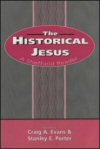
The Historical Jesus
- Author: Stanley E. Porter and Craig A. Evans
- Publisher: Sheffield
- Publication Date: 1995
- Pages: 314
This volume features a generous assortment of essays from the Journal for the Study of the New Testament on the historical Jesus. Discussing the issue under three headings, “Jesus, Discipleship and Covenant,” “Exegetical Aspects of Jesus’ Teaching,” and “Linguistic and Stylistic Aspects of Jesus’ Teaching,” the work presents the thoughts of well-known scholars on a variety of specific issues. Contributors include D.J. Moo (“Jesus and the Authority of Mosaic Law”), A. Ito (“The Question of the Authority of the Ban on Swearing”), M. Black (“The Aramaic Dimensions in Q with Notes on Luke 17:22 and Matthew 24:26 (Luke 17:23)”), and many others.
Craig A. Evans received his PhD from Claremont. He is Payzant Distinguished Professor of New Testament at Acadia Divinity College Wolfville in Nova Scotia, Canada.
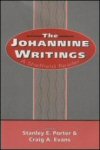
The Johannine Writings
- Author: Stanley E. Porter and Craig A. Evans
- Publisher: Sheffield
- Publication Date: 1995
- Pages: 267
This volume collects an array of scholarly articles from the Journal for the Study of the New Testament dealing with the Johannine writings and related issues. Separated into two parts, “The Gospel of John and Its Influences” and “The Revelation of John,” the work features essays by B. Lindars (“Discourse and Tradition: The Use of the Sayings of Jesus in the Discourses of the Fourth Gospel”), R. Bauckham (“The Beloved Disciple as Ideal Author”), J.J. Gunther (“The Elder John: Author of Revelation”) and many others.
Craig A. Evans received his PhD from Claremont. He is Payzant Distinguished Professor of New Testament at Acadia Divinity College Wolfville in Nova Scotia, Canada.
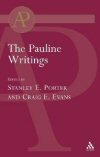
The Pauline Writings
- Editors: Stanley E. Porter and Craig A. Evans
- Publisher: Sheffield
- Publication Date: 1995
- Pages: 314
A collection of essays from leading academics in the field of Pauline studies culled from the Journal for the Study of the New Testament. This volume is broken down into four sections: “Paul the Apostle, Pauline Interpretation of Sacred Tradition,” “Pauline Theology,” and “Pauline Letter-Form and Rhetoric.” Contributors include D. Lüthermann (“Paul and the Pharisaic Tradition”), J.W. Aageson (“Typology, Correspondence, and the Application of Scripture in Romans 9–11”), K. Snodgrass (“Spheres of Influence: A Possible Solution to the Problem of Paul and the Law”) amongst many others.
Craig A. Evans received his PhD from Claremont. He is Payzant Distinguished Professor of New Testament at Acadia Divinity College Wolfville in Nova Scotia, Canada.
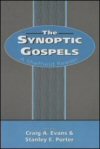
The Synoptic Gospels
- Author: Stanley E. Porter and Craig A. Evans
- Publisher: Sheffield
- Publication Date: 1995
- Pages: 313
Featuring a selection of essays from the Journal for the Study of the New Testament chosen by two top scholars in the field of biblical studies.
Craig A. Evans received his PhD from Claremont. He is Payzant Distinguished Professor of New Testament at Acadia Divinity College Wolfville in Nova Scotia, Canada.
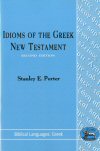
Idioms of the Greek New Testament, 2nd ed.
- Author: Stanley E. Porter
- Publisher: Sheffield Academic
- Publication Date: 1994
- Pages: 339
Idioms of the Greek New Testament is a ground-breaking grammar written with Stanley E. Porter’s unmatched understanding of New Testament Greek. The work aids the student of New Testament Greek in a number of ways. It can be used as an instructive handbook, as an intermediate level textbook, and as a basic reference work. The major topics of Greek grammar are treated in a helpful pedagogical sequence. Substantial discussions are provided on Greek verb structure, the case system, the use of prepositions, particles, and various types of clauses. The book also includes visual illustrations, references to other Greek grammars, a glossary of terms and full indexes.
Throughout Idioms, Porter keeps in mind the traditional categories of Greek grammar. However, he bases his analysis upon principles of modern linguistics. This foundation is translated and adapted for students and teachers who may not have had any exposure to its technical language and method. Among the innovative treatments found in the work are those on tense and aspect, mood and attitude, conditional clauses, word order and clause structure, and discourse analysis. Idioms of the Greek New Testament will be a welcome work for students needing a tool to guide them from elementary textbooks to fully fledged reference grammars . . . and for scholars seeking a useful New Testament Greek reference.
The Greek of the New Testament provides an eminently worthwhile and worthy body of literature for serious academic study, and my hope is that this grammar will enable many to take further steps towards its mastery.
—Stanley E. Porter, from the introduction
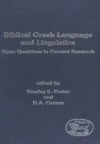
Do verbal tenses, such as aorist and imperfect, actually communicate a temporal reference—time—or do they communicate something else entirely—aspect? Or can the tenses sometimes communicate both time and aspect? The verbal aspect debate is one of the hottest topics in Biblical Greek linguistics. Edited by Stanley E. Porter and D.A. Carson, Biblical Greek Language and Linguistics brings together into one volume essays from scholars in the field of Greek and linguistics to examine the Greek language from a linguistic and grammatical perspective.
The first half of the book is devoted to verbal aspect, and includes essays by Stanley E. Porter and Buist Fanning, two central figures in the debate over verbal aspect. The second part of the book contains a potpourri of articles on other applications of modern linguistics to the Greek Bible, and includes essays by Jeffrey T. Reed, Paul Danove, Michael W. Palmer, and Mark S. Krause.
Donald A. Carson is a research professor of New Testament at Trinity Evangelical Divinity School in Deerfield, Illinois. He has been at Trinity since 1978. Carson came to Trinity from the faculty of Northwest Baptist Theological Seminary in Vancouver, British Columbia, where he served for two years as academic dean. He also taught at Northwest Baptist Theological College, Richmond College, and Central Baptist Seminary in Toronto. He has served as assistant pastor and pastor and has done itinerant ministry in Canada and the United Kingdom. Carson’s areas of expertise include biblical theology, the historical Jesus, postmodernism, pluralism, Greek grammar, Johannine theology, Pauline theology, and questions of suffering and evil. He is a member of the Tyndale Fellowship for Biblical Research, the Society of Biblical Literature, the Evangelical Theological Society, the Canadian Society of Biblical Studies, and the Institute for Biblical Research.
Stanley E. Porter (1956–) is a respected expert in Greek and New Testament studies. He received a BA from Point Loma College, an MA from Claremont Graduate School, another MA from Trinity Evangelical Divinity School, and a PhD from the University of Sheffield.
Porter is best known for his works on verbal aspects in New Testament Greek. He is a respected expert in Greek and New Testament studies worldwide, and is actively involved in OpenText.org and the Linguistics Institute of Ancient and Biblical Greek. He is also a regular columnist for Christian Week.
Porter currently serves as president, dean, and professor of New Testament at McMaster Divinity College. He is the author or editor of numerous studies in the New Testament and Greek language, including Idioms of the Greek New Testament, Discourse Analysis and the New Testament: Approaches and Results, and Dictionary of New Testament Background.
Reviews
2 ratings

Bryan T. Stephens
2/24/2016
J.R. Woods
6/2/2014
I would say that in terms of understanding both the history and language of the New Testament you cannot get better than this set with Dr. Porter. He specialized in Verbal Aspect coming out of his dissertation (which is published with Peter Lang and is surprisingly NOT in this set), but has gone on to publish, team up with, and spend his entire career focusing on the linguistic skills of the Biblical education craft. The lesson is simply this--while theology is crucial in terms of belief, ethics, ministry, and views of God, Linguistic skills--i.e., application of criteria, methodology, conclusions and evaluation--remains as THE quintessential skill for biblical studies because as far as that original New Testament community goes--"the language is all we have left." (besides the archaeology of course but even that is a semiotic of culture). This is where historical criticism wanted to go but did not have the tools. So that is where rhetorical criticism tried to pick up the baton but could not make it past the text. Now Sociolinguistics--the study of languages as they function in society--has already begun to come out with some outstanding research of how this NT text would have found its expression in the original communities when taken in tandem with the Social-Scientific findings. (the reason Porter will instruct you in Systemic Functional Linguistics as opposed to say Chomskian or Typological approaches) I don't recommend it because its new. I recommend it for its depth of insight gained into the text of Scripture as a real-world communication between people facing life-altering issues. As far as I'm concerned there simply is no better way to spend your money. If they had offered this set when I first received my library, I would have started with this set, combed through its bibliography and expanded my library from there.